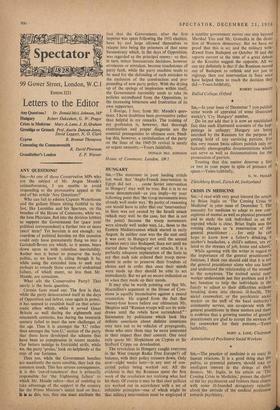Letters to the Editor
Any Questions? Dr. Donald Mcl. Johnson, MP Hungary Robert Oakeshott, G. W. Prager Crisis in Medicine Mary A. Lane, J. D. Graham Grenidge or Grinach Prof. Austin Duncan-Jones, David Leggatt, N. 0. Clark Cyprus R. Brennar Thompson
Cementing the Commonwealth
R. David Plowman Grandfather's London E. P. Warner
ANY QUESTIONS?
SIR,—As one of those Conservative MPs who arc the subject of Mr. Angus Maude's animadversions, I am unable to avoid responding to the provocative appeal at the end or his article 'Any Questions?'
Who can fail to admire Captain Waterhouse and the gallant fifteen sitting faithful to the last, like Leonidas and his Spartans, on the benches of the House of Commons, while we, the base Phocians, fled into the division lobbies to support the Government for (pace your political correspondent) a further two or more years' term? Yet heroism is not enough: an overdose of political heroism on this occasion could only have prematurely flung us into a Gaitskell-Bevan era which, so it seems, bears down upon us with relentless inevitability. Rather was it better to preserve the body politic, as we know it, ailing though it be, while using the extended time to seek and perhaps to remedy those causes of undoubted failure, of which many, no less than Mr. Maude, arc conscious.
What ails the Conservative Party? That surely is the basic question.
Certain facts stand out. The first is that, while the party democratised itself in the days of Opposition and defeat, once again in power, it has seemed to establish itself on that aristo- cratic ethos which, while it served Great Britain so well during the eighteenth and nineteenth centuries, has during the twentieth century failed to meet the new challenges of the age. Thus it is amongst the `U,' rather than amongst the 'non-U,' section of the party that there have developed the schisms that have been so conspicuous in recent months. Our betters indulge in fratricidal strife, while we, the party 'proles,' look on helplessly at the ruin of our fortunes.
Thus too, while the Government benches are manifestly the more sensible, they lack the common touch. This has serious consequences. It is this 4out-of-touchness' that is primarily responsible for 'the frightening failure' to which Mr. Maude refers—that of omitting to take advantage of the support in the country for the Prime Minister's initial lead on Suez. It is to this, too, that one must attribute the
fact that the Government, after the first impetus was spent following the 1951 election, have by and large allowed themselves to relapse into being the prisoners of that same bureaucracy which, in the days of Opposition, was regarded a the principal enemy: so that, in turn, minor bureaucratic decisions, however erroneous or mistaken, become touchstones of party faith, while the party machine tends to be used for the defending of such mistakes to the exclusion of the construction and pro- pounding of new party policy. With the drying up of the springs of inspiration within itself, the Government inevitably tends to take its policies secondhand from the Opposition, to the increasing bitterness and frustration of its own supporters.
I diverge, I fear, from Mr. Maude's ques- tions. I have doubtless been provocative rather than helpful in my remarks. The training of my profession is, however, that thorough examination and proper diagnosis are the essential prerequisites to ultimate cure. Pend- ing this, however, a revitalisation of the party on the lines of the 1945-50 revival is surely an urgent necessity.—Yours faithfully,
DONALD MCI. JOHNSON
House of Commons, London, SW1


































 Previous page
Previous page